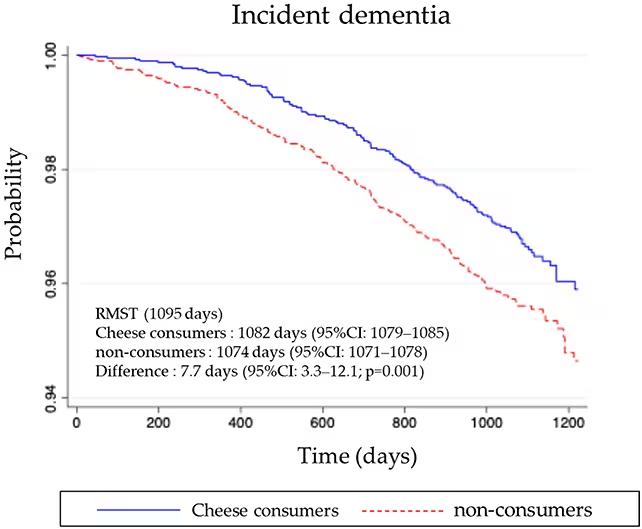4 Minutes
Does a taste for cheese tell us something about future brain health? A new Japanese cohort study suggests a small but measurable association between eating cheese and lower dementia rates among older adults. The result doesn’t prove causation, but it adds to the growing evidence linking diet, gut health and cognitive decline.
A modest association from a large older-adult study
Researchers commissioned by Meiji Co. analyzed health records for 7,914 people aged 65 and over, tracking outcomes for three years. Roughly half of participants reported eating cheese at least once per week; the other half said they never ate cheese. During follow-up, 134 people (3.4%) in the cheese-eating group developed dementia compared with 176 people (4.5%) in the non-cheese group — a difference of about 10–11 extra cases per 1,000 people over three years.
That gap is small for an individual, but when projected across a whole population it could be meaningful, the authors argue. The study adjusted for common confounders such as age, sex, education and income, and also ran a secondary analysis controlling for overall diet quality. While the association was weaker after accounting for healthier diets, it remained statistically significant.

Why cheese might matter for cognition
So what could explain this link? The study itself didn’t include biomarker or mechanistic tests, but several plausible pathways exist:
- Nutrients important for the brain: Cheese provides fat-soluble vitamins such as vitamin K, along with protein and minerals that support neuronal function.
- Fermentation and the gut–brain axis: Many cheeses contain live bacteria and fermentation products that can shape gut microbiota. Mounting research connects gut health with brain health via inflammation and immune signaling.
- Cardiovascular benefits: Fermented dairy has been linked in other studies to better heart health, and vascular health is a major factor in dementia risk.
These mechanisms are not mutually exclusive — diet, microbes and vascular health often interact. The authors noted that, particularly in countries with low baseline cheese intake like Japan, even modest differences could contribute to dementia prevention strategies at the population level.
Limitations and why causation remains uncertain
Observational findings like these cannot prove cause and effect. Eating cheese might simply mark other healthy behaviors — for example, those who include cheese in their diet may also have higher overall diet quality, better socioeconomic status or different patterns of social eating and activity. Although the researchers adjusted for several variables, residual confounding is always possible.
Other limitations: the follow-up period was relatively short (three years) for tracking dementia onset, self-reported food frequency can be imprecise, and the study didn’t examine specific cheese types or serving sizes. The authors call for work to clarify dose–response relationships, the role of different cheese subtypes, and underlying biological mechanisms.
Public-health perspective: small effect, potentially wide reach
Dementia affects tens of millions worldwide and is a growing public-health concern as populations age. Small individual effects can add up when applied across whole communities, particularly in countries with aging demographics. While this study doesn’t justify recommending cheese as a guaranteed preventive measure, it does support broader efforts to study diet as a modifiable risk factor for cognitive decline.
Expert Insight
"This is a useful piece of the larger puzzle linking nutrition and brain aging," says Dr. Maria Alvarez, a geriatric neurologist and science communicator. "We should treat cheese as one potential contributor among many — physical activity, vascular risk management and social engagement remain primary strategies. Still, exploring how fermented foods influence the gut–brain axis could open new preventive pathways."
The full study appears in Nutrients (2025). The research team emphasizes further research to test mechanisms, evaluate specific cheese varieties, and determine whether the association holds across different populations and longer follow-up periods.
Source: sciencealert
Comments
Tomas
Wow cheese as brain food? I wanna believe but feels a bit overhyped, still gonna add a slice to my salad, why not lol
bioNix
Is this even true? Cheese lovers might just have healthier lifestyles, or is gut bacteria the key? 3 yrs seems short though.


Leave a Comment